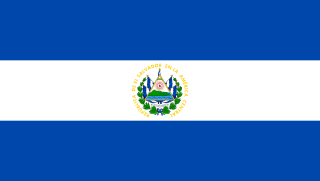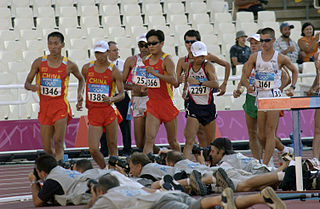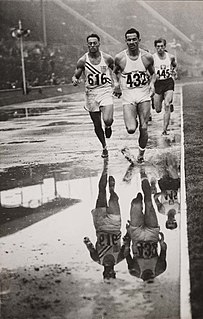
The Solomon Islands sent a delegation to compete at the 2004 Summer Olympics in Athens, Greece, from 13–29 August 2004. This was the nation's sixth appearance at a Summer Olympic Games since their debut in the 1984 Summer Olympics. The Solomon Islands sent two athletes to these games, both in track and field: Francis Manioru and Jenny Keni. Manioru competed in the men's 100 meters and Keni in the women's event of the same distance. Neither advanced out of their event's heats.

Belize sent a delegation to compete at the 2004 Summer Olympics in Athens, Greece, from 13–29 August 2004. This was the Central American country's ninth appearance at a Summer Olympic Games. The delegation consisted of two track and field athletes: Michael Aguilar and Emma Wade; neither advanced beyond the first round of their events.

Togo competed at the 2004 Summer Olympics in Athens, Greece, from 13 to 29 August 2004. The country's participation at Athens marked its seventh appearance in the Summer Olympics since its debut at the 1972 Summer Games in Munich, West Germany. The delegation included two track and field athletes and a single canoeist; Jan Sekpona in the men's 800 metres, Sandrine Thiébaud-Kangni in the women's 400 metres, and Benjamin Boukpeti in the men's K-1. Both Sekpona and Thiébaud-Kangni were eliminated in the first round of their competitions, while Boukpeti progressed to the semi-finals.
Wheelchair racing at the 2000 Summer Olympics featured as a demonstration event within the athletics programme on 28 September 2000. There were two events, an 800 m race for women and a 1500 m race for men. Medals were not awarded, as the sport was not part of the official competition.
Wheelchair racing at the Summer Olympics featured as demonstration competitions at the multi-sport event, appearing within the Olympic athletics programme from 1984 to 2004. On each occasion two track races were held: a men's 1500 metres race and a women's 800 metres race. This was the first time events for disabled athletes have featured at the Summer Olympic Games, with the Paralympic Games being the traditional venue for top level para-athletics. The wheelchair races were the second Olympic exhibition event for disabled athletes, following on from the disabled skiing at the 1984 Winter Olympics, held earlier that year.

El Salvador first competed in the Paralympic Games at the 2000 Summer Paralympics in Sydney, Australia. It has participated in the Summer Paralympic Games every four years since that time. El Salvador has never taken part in the Winter Paralympics, and until Tokyo 2020, no Salvadorian had won a Paralympic medal. In 2021, Herbert Aceituno became the first athlete to win a medal, earning bronze in powerlifting at the 59 kg category.

Marcel Eric Hug is a Paralympian athlete from Switzerland competing in category T54 wheelchair racing events. Hug, nicknamed 'The Silver Bullet', has competed in four Summer Paralympic Games for Switzerland, winning two bronze medals in his first Games in Athens in 2004. In 2010 he set four world records in four days, and at the 2011 World Championships he won a gold in the 10,000 metres and four silver medals, losing the gold in three events to long term rival David Weir. This rivalry continued into the 2012 Summer Paralympics in London, where Hug won two silvers, in the 800m and the marathon. In the 2013 World Championships Hug dominated the field, winning five golds and a silver. During the 2016 Summer Paralympics in Rio, Hug was one of the most consistent competitors in the T54 class, winning two golds, in the 800 m and marathon, and two silvers medals, in the 1500m and 5000m.

The 100 metres at the Summer Olympics has been contested since the first edition of the multi-sport event. The men's 100 metres has been present on the Olympic athletics programme since 1896. The 100 metres is considered one of the blue ribbon events of the Olympics and is among the highest profile competitions at the games. It is the most prestigious 100 metres race at elite level and is the shortest sprinting competition at the Olympics – a position it has held at every edition except for a brief period between 1900 and 1904, when a men's 60 metres was contested.

The 400 metres at the Summer Olympics has been contested since the first edition of the multi-sport event. The men's 400 m has been present on the Olympic athletics programme since 1896 but nearly seventy years passed before the introduction of the women's 400 m, which has been held continuously since the 1964 Games. It is the most prestigious 400 m race at elite level. The competition format typically has two qualifying rounds leading to a final race between eight athletes.

The 800 metres at the Summer Olympics has been contested since the first edition of the multi-sport event. The men's 800 m has been present on the Olympic athletics programme since 1896. The women's event was first held in 1928, making it the first distance running event for women. However it was not held again until 1960, since when it has been a permanent fixture. It is the most prestigious 800 m race at elite level. The competition format typically has three rounds: a qualifying round, semi-final stage, and a final between eight runners.

The 1500 metres at the Summer Olympics has been contested since the first edition of the multi-sport event. The men's 1500 m has been present on the Olympic athletics programme since 1896. The women's event was not introduced until over seventy years later, but it has been a permanent fixture since it was first held in 1972. The Olympic final and the World Athletics Championship final are the most prestigious 1500 m races at an elite level. The competition format comprises three rounds: a heats stage, semi-finals, then a final typically between twelve athletes.

The 10,000 metres at the Summer Olympics is the longest track running event held at the multi-sport event. The men's 10,000 m has been present on the Olympic athletics programme since 1912. The women's event was added to the programme over seventy years later, at the 1988 Olympics. It is the most prestigious 10,000 m race at elite level. The competition format is a straight final between around 30 athletes, although prior to 2004 a qualifying round was held.

The 4×400 metres relay at the Summer Olympics is the longest track relay event held at the multi-sport event. The men's relay has been present on the Olympic athletics programme since 1912 and the women's event has been continuously held since the 1972 Olympics. The inaugural and so far the only mixed 4 × 400 metres relay was held at the 2020 Olympics. It is the most prestigious 4×400 m relay race at elite level. At the 1908 Summer Olympics, a precursor to this event was held – the 1600 m medley relay. This event, with two legs of 200 m, one of 400 m, and a final leg of 800 m, was the first track relay in Olympic history.

The sprint hurdles at the Summer Olympics have been contested over a variety of distances at the multi-sport event. The men's 110 metres hurdles has been present on the Olympic athletics programme since the first edition in 1896. A men's 200 metres hurdles was also briefly held, from 1900 to 1904. The first women's sprint hurdling event was added to the programme at the 1932 Olympics in the form of the 80 metres hurdles. At the 1972 Games the women's distance was extended to the 100 metres hurdles, which is the current international standard.
Wheelchair racing at the 1996 Summer Olympics featured as a demonstration event within the athletics programme on 1 August 1996. There were two events, an 800 m race for women and a 1500 m race for men.
Wheelchair racing at the 1992 Summer Olympics featured as a demonstration event within the athletics programme on 2 August 1992. There were two events, an 800 m race for women and a 1500 m race for men. Medals were not awarded, as the sport was not part of the official competition.
Wheelchair racing at the 1988 Summer Olympics featured as a demonstration event within the athletics programme on 30 September 1988. There were two events, an 800 m race for women and a 1500 m race for men. Medals were not awarded, as the sport was not part of the official competition.
Wheelchair racing at the 1984 Summer Olympics featured as a demonstration event within the athletics programme on 11 August 1984. There were two events, an 800 m race for women and a 1500 m race for men.

Race walking events at the Summer Olympics have been contested over a variety of distances at the multi-sport event. There are three race walking events in the current Olympic athletics programme: a men's and a women's 20 kilometres walk, and a men's 50 kilometres walk. The races are held in a final-only format.

Combined events at the Summer Olympics have been contested in several formats at the multi-sport event. There are two combined track and field events in the current Olympic athletics programme: a men's decathlon and a women's heptathlon.













